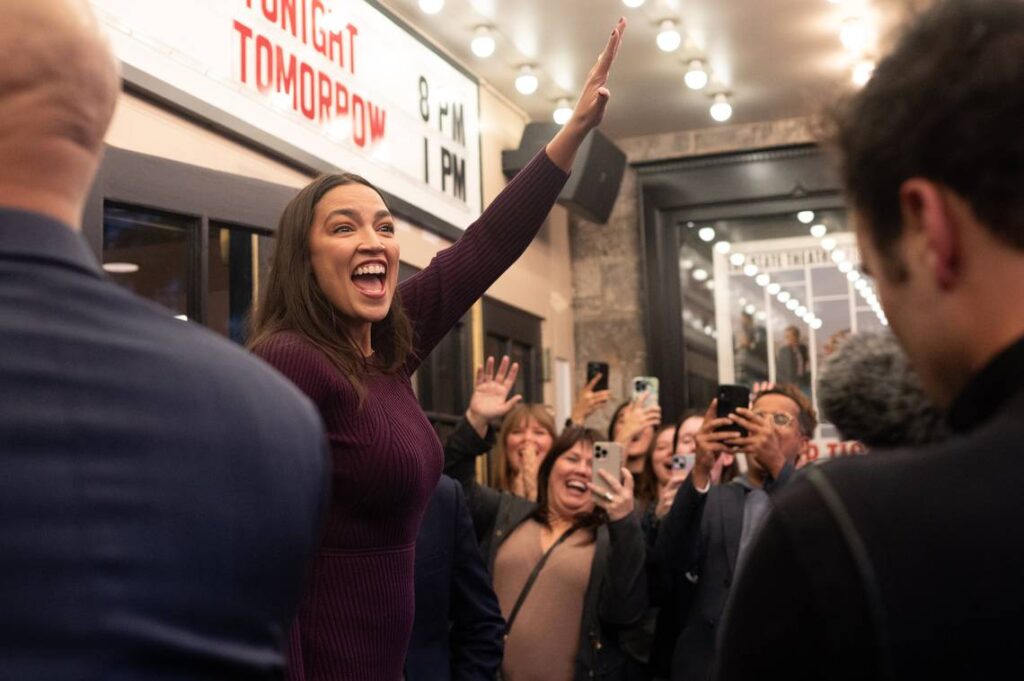On October 18, 2024, the State Theatre in State College, Pennsylvania, became a gathering place for hundreds of Penn State students and community members who came to hear Congresswoman Alexandria Ocasio-Cortez endorse the Democratic ticket of Kamala Harris and Tim Walz. The event began with a long line of supporters, many sporting campaign merchandise and “kamala is brat” pins, reflecting the momentum of Harris’s campaign driven by social media engagement. As the theater reached its full capacity of 591 seats, an additional crowd of about 100 people waited outside, listening to Ocasio-Cortez’s speech broadcasted through the venue’s speakers, showcasing the high level of enthusiasm surrounding the campaign event.
During her 23-minute address, Ocasio-Cortez highlighted critical issues, including health care, reproductive rights, and the importance of political involvement within the Democratic caucus. She urged attendees not only to vote but also to encourage others in their community to participate in the electoral process. Her emphasis on engagement before and after the election indicates a broader strategy focused on community mobilization. “It’s just the beginning,” Ocasio-Cortez proclaimed, hinting at the potential impact of a Harris-Walz victory extending beyond the election day itself, highlighting the notion that the most influential voters are those who transition from sitting on the couch to voting at the polls.
Reflecting on her own political journey, Ocasio-Cortez acknowledged her previous support for Joe Biden in 2020 while emphasizing her current active campaigning for Harris and Walz. She stressed that structural changes in government would not solely result from individual leaders but must originate from grassroots movements involving the collective efforts of citizens. This perspective further reinforced the idea of a “big tent” within the Democratic Party, where unity amid diversity is essential, despite the potential for disagreement among members. Ocasio-Cortez’s message of collaboration included an appeal to the audience to prioritize common ground to strengthen the coalition.
The event attracted a diverse crowd, including not only Penn State students but also community members who connected with Harris’s platform on various social issues, including women’s rights and economic equity. Some attendees, like sophomore Madonna Akabuno, expressed their urgency due to pressing concerns surrounding reproductive health and systemic reforms in police practices, framing the election as a pivotal moment for democracy. Akabuno articulated the importance of supporting the Harris-Walz ticket to safeguard ideals that she and others value, reflecting the high stakes perceived by many citizens in the election.
Denise St. Pierre, a local community member, echoed similar sentiments regarding the surprising diversity of the audience, who transcended generational lines. Her experience at the event highlighted the collective spirit of the community, bringing together varying perspectives focused on a shared aim: to support the Harris campaign. This aspect of the event illustrated the unifying effect that political events can have in fostering dialogue and inclusivity, even amidst individual differences.
Ocasio-Cortez’s appearance didn’t occur in isolation, as it was part of a larger landscape of political activity in Centre County leading up to the November 5 election. Other events included a talk from former Republican presidential candidate Vivek Ramaswamy, consolidating the region’s status as a critical battleground for both major parties. Upcoming events, like the Blue Wall Bus Tour featuring Democratic Governors, exemplified the high stakes of the election, positioning State College as a focal point for political engagement and campaigning as candidates seek to mobilize voters in a state pivotal to the electoral outcome.

